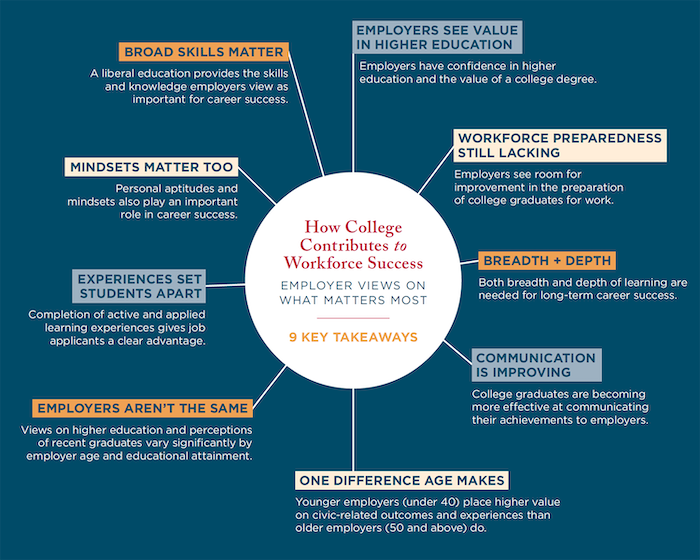In the quality assurance literature, the characteristics of quality are primarily expressed in the language of the employers who hire institutions’ graduates (Learn & Work Ecosystem Library: Quality and Value). The following characteristics often are listed as indicators of quality:
The literature also cites a distinctive set of institutional characteristics and behaviors that increase the likelihood that the above outcomes will be realized. These characteristics include:
In a national survey of employers conducted by Northeastern University, a large majority of human resources leaders said that the value of educational credentials in hiring has either increased (48%) or held steady (29%) over the last five years (Gallagher, 2019).
In a recent survey of 510 employers from the University Professional and Continuing Education Association (UPCEA) and Collegis Education, respondents said they value alternative credentials but have concerns over assessing the quality of education and understanding the skills and competencies they represent. Survey respondents selected challenges they associated with assessing candidates whose resumes include alternative credentials. Almost half of them (46%) said they were unsure about the quality of the education; 42% said the same about the skills and competencies credentials represent; and 33% weren’t sure how the credentials aligned with job standards.
AAC&U’s 2021 survey of executives and hiring managers conducted in partnership with Hanover Research explores employers’ views on a variety of issues, including what constitutes workforce preparedness. They also were asked what educational outcomes and experiences they value most when making hiring decisions, and shared their perceptions of recent graduates’ levels of preparedness for entry-level positions as well as for promotion and career advancement. The survey focuses on employer value in higher education and the value of a college degree, especially a liberal arts education. While it did not focus on the increasing array of non-degree credentials, the following findings from the report may be instructive to those seeking to design new credentials:
AAC&U: How College Contributes to Workforce Success: Employer Views on What Matters Most


Credential As You Go has acquired three phases of funding to date. Lumina Foundation funded Phase I, resulting in the Incremental Credential Framework for testing. The Institute of Education Sciences, U.S. Department of Education funds Phase II (Grant R305T210063), which focuses on rapid prototyping of and research on incremental credentials with a national campaign. An anonymous private donor fund at the Program on Skills, Credentials & Workforce Policy at George Washington University funds the development of the prototype Learn and Work Ecosystem Library. Walmart funds Phase III, which focuses on systems change for expansion and sustainability of incremental credentials. The opinions expressed are those of the authors and do not represent views of Lumina Foundation, Institute of Education Sciences, the U.S. Department of Education, Walmart, or George Washington University.